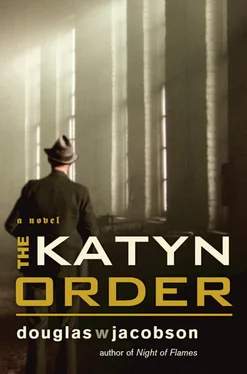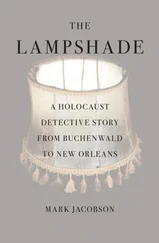For the first time in what seemed like an eternity, Adam thought back to his arrival in America when he was eleven years old. That first year had been difficult. He hated to leave Krakow, had cried off and on for days, missing his uncle and aunt terribly. When they finally arrived in Chicago, he had felt lost and alone. He had to learn a new language, new customs. Though there were many Poles in their new neighborhood, it was still very strange, very different from Krakow—bigger and noisier, tall buildings, motorcars and elevated street cars.
But gradually, as the months went by, he’d come to feel at home. He had made friends, learned to play baseball and did well in school. Then, seven years later, he had graduated from high school and become an American citizen all in the same day. It was the proudest day of his life. He remembered every detail with complete clarity: writing the test answers, signing the documents, then standing with his father and facing the red-and-white striped flag with the glittering blue field of stars, his right hand over his heart, reciting the pledge of allegiance to his new home. That was the day he decided he would become an American soldier.
Adam looked out the window again, thinking of that simple, carefree time when it seemed as though everything were possible, as though every dream would come true and he could be whatever he wanted to be.
He glanced around at the American soldiers in the transport plane. He felt a kinship with them, but at the same time he was an outsider. They were the first of his countrymen he’d actually been around since the war began.
In all the years Adam had been fighting his own covert war of sabotage and murder behind enemy lines, he’d encountered numerous German soldiers. Most of them had been officers he’d eventually assassinated. And then there were the hundreds of Polish soldiers he’d fought with. They had set aside the sting of defeat and joined the covert warfare of the AK. They had sabotaged German trains and destroyed fuel depots, smuggled information and forged documents. The Americans had fought, and they had suffered hardships and lost friends. But they could never know what it meant to face the enemy on their own home soil, to witness the destruction of their homes and the deaths of their family members—and then to lose that fight. Adam was an American, and he would always be an American. But he was also a Pole, and he knew a part of his heart would forever belong to the country of his birth and the courageous people who faced tragedy again and again without surrendering.
The big four-engine plane bumped hard onto the uneven runway, roaring past wrecked tanks and burned-out trucks. The plane swung to the right, and the terminal building came into view. Adam turned to the air corps officer. “I’m surprised the terminal is intact.”
“We didn’t want to bomb it because we thought we’d need it,” the officer said. “And when the Russians moved in they were in such a rush to get to the Reichstag, they just bypassed it. Hell, Lufthansa was still operating commercial flights out of here until the end of April.”
Adam pointed to the Soviet hammer-and-sickle flag flying from the top of the building, just below the enormous stone sculpture of the Nazi eagle.
The officer shrugged. “Yeah, I know. Supposedly, the aerodrome is in our sector, but the Russians are finding every way possible to delay the handover. So far, between us and the Brits, we’ve only been able to get a little over two hundred men into Berlin. More are trickling in every day, but the Russians have twenty divisions here, so they’re calling the shots.”
The plane came to a halt, and a detachment of Russian soldiers marched out of the terminal, forming a corridor between the plane and the building. Their khaki uniforms were accented with grayish-green hats adorned with red bands and a solitary gold star.
The air corps officer nudged Adam’s shoulder. “NKVD,” he said. “A little intimidation as our welcome to Berlin. They’re the Russian equivalent of the German SS.”
No, they’re actually quite a bit worse than the SS. But Adam nodded and peered out the tiny window at the familiar soldiers, the very bastards he’d been evading for months. And now he was going to walk right up to them in broad daylight?
He stood up, put on his new, gray overcoat and fedora, and straightened his tie. His credentials and documents were supposedly solid, identifying him as a Civilian Liaison Officer attached to the U.S. Judge Advocate General—War Crimes Investigation Team. Adam exhaled slowly. He was having a difficult time just remembering the title.
He retrieved his suitcase from the luggage cart and followed the air corps officer into the terminal. They queued up behind a table where two NKVD soldiers, wearing the distinctive blue hats of officers, checked documents. The officers were flanked by a half-dozen NKVD riflemen. Beyond the checkpoint, milling about in a cloud of cigarette smoke punctuated with bursts of laughter and profanity, a group of American and British soldiers awaited the new arrivals.
When Adam reached the table, he handed his credentials to one of the officers who gave him a long hard look, then muttered something in Russian. The second officer laughed at the apparent joke and looked up at Adam, shaking his head.
Adam remained silent and kept his eyes on the officer holding his credentials, wishing he had a pistol under his coat. It was the first time in many years he’d been without a weapon, and he felt naked. The officer was a major with the NKVD 105th Frontier Guards Division. He looked to Adam exactly like every cartoon he’d ever seen of Russian officers—a squat, thick-necked Ivan.
The major studied Adam’s credentials for a long time, then looked up and snarled a question in Russian.
Adam responded in English, “I don’t understand.”
The major scowled and called over his shoulder to one of the riflemen.
The rifleman stepped forward, bent down and listened to whispered instructions. Then he straightened up and stepped toward Adam.
“Hold on!” someone shouted from behind the table.
The din of chatter and laughter in the terminal abruptly ceased as an American army officer pushed through the crowd, followed by two American Eighty-Second Airborne troopers toting submachine guns.
The American officer, who was about average in height, but solidly built with curly black hair, looked down at the NKVD major and pointed at Adam. “This man is with us. May I have his papers?”
The Russian glared at the American, and Adam knew that this Ivan wanted nothing more than to be able to stand up toe-to-toe, but the American officer had moved in too close. A momentary stare-down ensued. Finally, the Russian major turned back to Adam and held out the papers, gesturing with a jerk of his head for him to move on.
Adam snatched his papers and squeezed past the Russian rifleman, who had not backed off. The two Eighty-Second Airborne troopers fell in behind Adam and the American officer as the crowd of American and British soldiers opened a pathway for them to the terminal exit. Adam heard a British voice shout, “Way to go, Yank. Give the bloody bastard hell!”
Outside, the American officer led the way to the first of two Jeeps flying U.S. flags and motioned for Adam to climb in the backseat. A very young-looking American corporal sat behind the wheel. A moment later, a Russian Army truck rumbled alongside with two NKVD officers in the cab and four scruffy, unshaven Red Army soldiers sitting on benches in the open rear compartment. The driver nodded at the Americans, gunned the engine and swerved in front, spraying the Jeep with dust and bits of gravel. The young American corporal spit the dust from his mouth and mumbled an obscenity as he shoved the Jeep into gear.
Читать дальше












